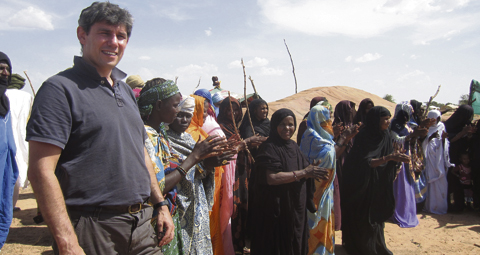December 25 | ![]() 0 COMMENTS
0 COMMENTS ![]() print
print

Support for SCIAF makes a difference
By Alistair Dutton
I landed in Sri Lanka on January 1, 2005, just seven days after the Boxing Day Tsunami smashed into coastlines across Asia, leaving 230,000 people dead and millions homeless, grieving and in need of immediate help.
St Stephen’s Day in 2004 had started like any other. No doubt many of us were recovering from the excesses of Christmas Day. News then broke of the massive 8.9 earthquake off the coast of western Indonesia and the massive waves which had swept across its coast together with others including India and Sri Lanka.
As I entered the disaster zone it was clear that the tsunami had left a trail of complete destruction in its wake. Trees had been snapped in half and buildings completely flattened. Those who survived had started to venture back to the coastal areas, looking for loved ones and sifting through the wreckage for their personal belongings. Personal effects such as wedding photographs, clothes and furniture were laid to waste for all to see.
I was there as part of a Caritas delegation sent to set up the Catholic Church’s emergency response on the east coast of Sri Lanka. As always in these situations the local people had been first to respond and local Church volunteers were already cooking hot meals for survivors and giving out essentials like clothes, water and soap.
Our main focus was to build on the work that was already happening and get people into temporary shelters so they could at least feel warm, dry and secure. Between us, and working alongside many other organisations, the Caritas family, including SCIAF, set about building 30,000 temporary shelters. These modest little huts were made up of a small bedroom and living area with a roof made of local slate to keep the sun and rain out. We provided the materials, largely sourced locally, and the survivors themselves put the shelters together. Many local people volunteered to help us deliver aid to those who needed it most in those early days.
All of this work was only possible due to the extreme generosity of people in Scotland and around the world. The response from the public was bigger than any disaster before or since, with SCIAF alone receiving £2.7million. This cash not only helped us to provide food, water, clothes and temporary shelters in the immediate aftermath, it meant we were able to stay with the people and help them recover in the long term. This included working with survivors to build permanent homes, helping them get back to work and earn a much needed income to provide for their families, as well as supporting children to go back to school.
In early December I had the good fortune to return to Sri Lanka, to meet many of the survivors and colleagues I’d worked with at the time, and also witness the way the people and country had moved on. I met Malar and Michael who had both lost their spouses in the tsunami. They had gone on to marry and I felt very lucky to visit their home, one we had helped to build, in time to celebrate the first birthday of their beautiful daughter. I met many others who were still benefitting from the permanent and more resilient housing that we had helped to build.
It is not possible to fully remove the heartache and pain of losing loved ones and experiencing a disaster on this scale, but my time in Sri Lanka gave me hope. With the love and support of people in Scotland and around the world, the work of SCIAF and the Caritas family really does help
people not only to survive in the short term but to prosper and heal physically, spiritually and
emotionally in the long-term. In many cases, we have helped people like Malar and Michael to build back better and have a more prosperous and hopeful future for themselves and their families.
This is something you, and all who supported SCIAF’s response, should be very proud of this St Stephen’s Day.
— Alistair Dutton is the director of SCIAF











